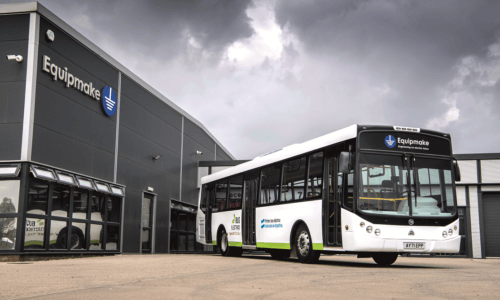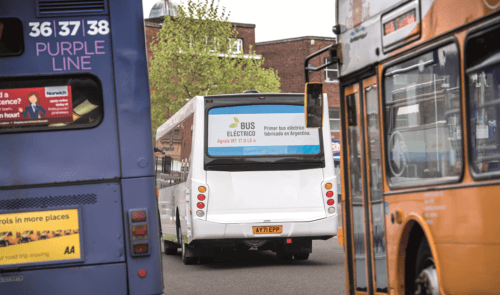
Following final testing in Norfolk, the new bus for Buenos Aires, which shares the same driveline as the forthcoming Beulas-bodied Jewel E for London, will begin in-service trials on the streets of the Argentine capital in late 2022
Following completion of final testing in the UK, the electric bus being developed by Equipmake and featuring the company’s own zero-emission powertrain, has left the firm’s Norfolk base on its journey to Buenos Aires where it will begin in-service trials.
Marking the first overseas on-road trial of an Equipmake-developed electric bus, the zero-emission single decker is set to start in-service running in Argentina’s capital in the third quarter of this year. Developed as part of the Advanced Propulsion Centre-funded CELEB (Cost Effective Low Entry Bus) project – in which Equipmake has led multiple international partners over the last three years – the objective of the programme has been to deliver a cost-effective bus designed for the South American market.
Working with Brazilian bus manufacturer Agrale and Argentinian coachbuilder Todo Bus, Equipmake has developed an electric version of the Agrale MT17.0LE single-decker, installing its own zero-emission drivetrain (ZED). The ‘state-of-the art, modular and scale-able’ battery drivetrain, developed at Equipmake’s headquerters in Snetterton, is the same technology also used in Equipmake’s new London-specification bus, the double-deck Jewel E.
The Agrale MT17.0LE project features a bespoke Equipmake ZED with a 318kWh lithium-ion battery, Equipmake’s own HTM 3500 electric motor – producing 3,500Nm of torque at 1,000rpm and 400kW maximum power, integrated into the prop shaft without the need for a separate transmission – and a Semikron SKAI inverter. Over the last 12 months, Equipmake’s engineering team has put the new bus through a durability test programme in and around Norfolk, with thousands of test miles completed on proving grounds, city centres (including Norwich) and on motorways.
From this robust test programme, Equipmake estimates the new electric Agrale MT17.0LE will have a range of up to 150 miles (240km), which it says is more than enough for a day’s use in Buenos Aires. After a complete duty cycle the battery will be recharged at the depot overnight via a CSS2 DC charging point.
The 12m bus is capable of carrying up to 70 passengers, and will be operated over the next 12 months by DOTA, the largest bus operator in Buenos Aires. Following the successful completion of the trial, the objective is for mass manufacture to begin in Buenos Aires with Agrale and Todo Bus using licenced Equipmake ZED technology.

Ian Foley, Managing Director of Equipmake, said: “On behalf of everyone at Equipmake I am delighted that, following the completion of final testing here in Norfolk, the Agrale MT17.0LE featuring our ZED system now begins its journey to Buenos Aires for in-service trials. Through this innovative Advanced Propulsion Centre-funded project, we have worked closely with Agrale and Todo Bus along with other key partners, and the result is a state-of-the-art yet cost-effective bus.
“We are now looking forward to the start of the trial and the potential for this new vehicle is huge. Buenos Aires has around 16,000 buses on its streets – roughly twice the size of London’s fleet. There’s no doubt that electric buses can play a significant role in helping Argentina’s capital hit its 2050 net zero objective.”
Equipmake’s ZED system also underpins the Jewel E, a new double-decker electric bus developed with Spanish bus builder Beulas. Designed to deliver clean, cost-effective zero-emission urban transport, the Jewel E’s modular battery pack has options of up to 548kWh, with a claimed maximum range of up to 300 miles on a single charge. It will begin in-service trials with Go-Ahead in London in the coming months.
Equipmake’s ZED system also enables the repower of almost any type of bus. Replacing an existing drivetrain, the company’s repower programme involves an inspection of each bus to ensure adaptability. Once its suitability is verified, the firm has the capacity to complete up to five repowers per week. Each repower is tailored to specific operator requirements, with service routes simulated to ensure the correct battery power level is selected for optimum performance and efficiency, and guaranteed ranges of 150 to 250 miles, more than sufficient for a complete duty cycle, says Equipmake.
The conversion is quoted as costing less than half the price of a new electric bus, allowing operators to make significant efficiencies by repowering a bus halfway through its working life.
Ian added: “In parallel with the creation of new electric buses, repowering is an important and cost-effective transitionary technology that can bridge the gap between diesel and a new electric bus fleet. There is a clear appetite for the technology, with strong demand from operators, leading to the expansion of our facilities in Norfolk. We believe interest will only increase and, next to the associated financial benefits, repowered vehicles can very quickly bring cleaner air to any town or city.”

